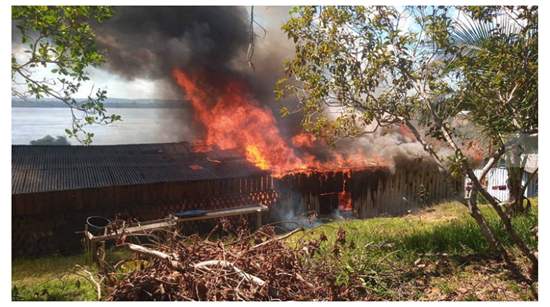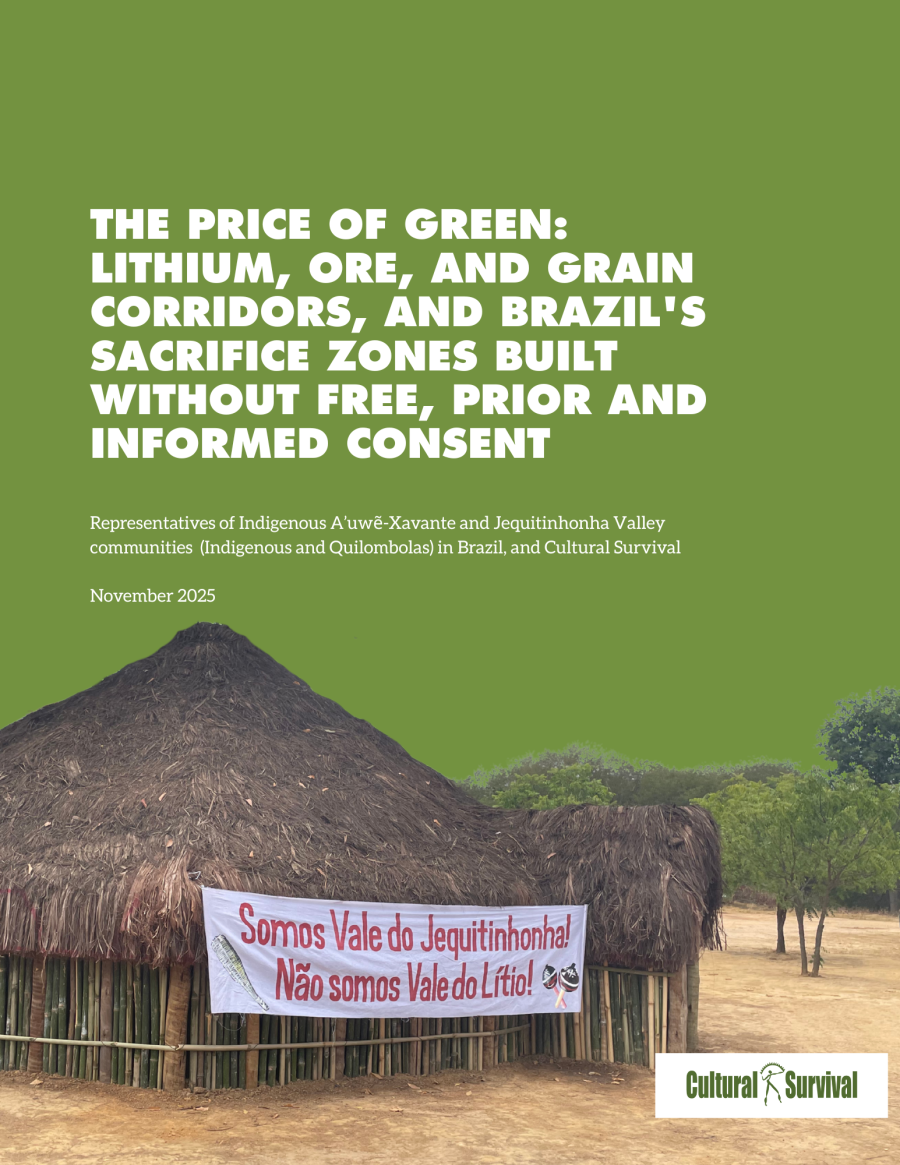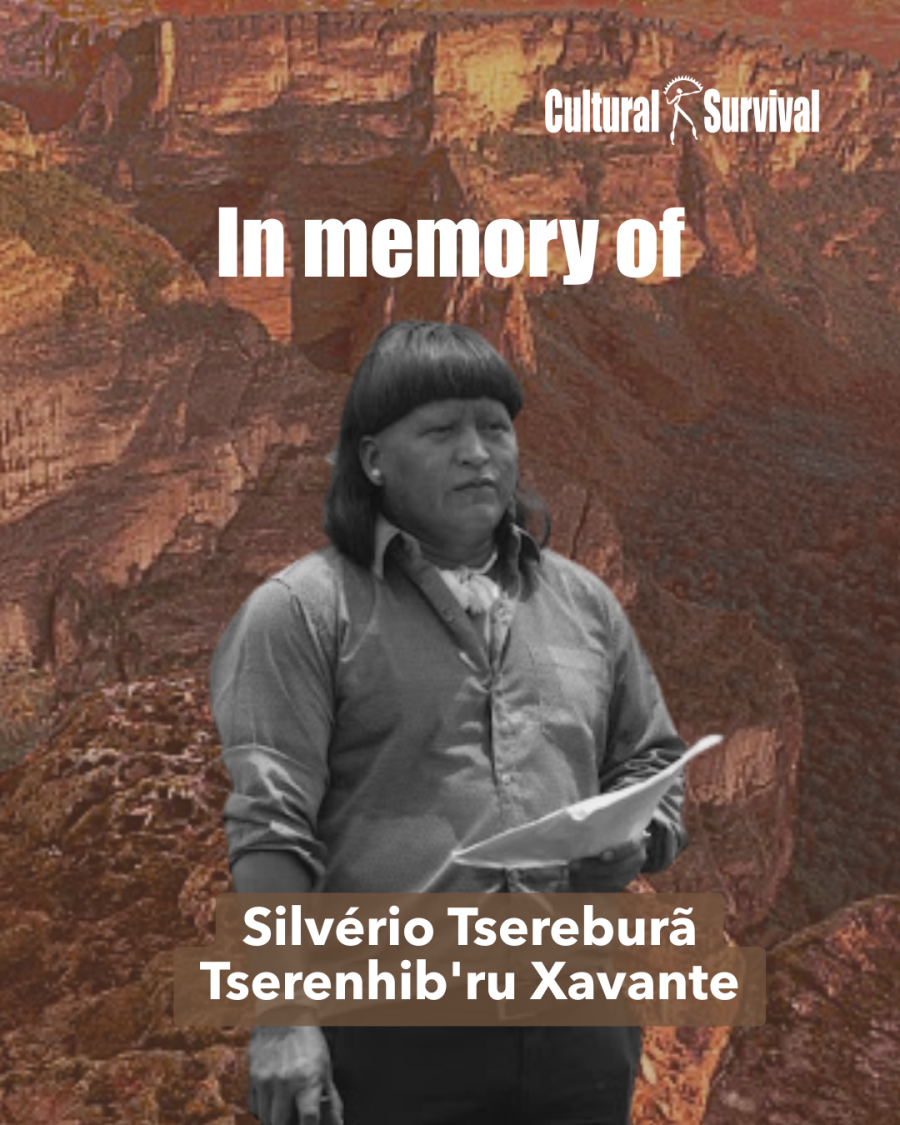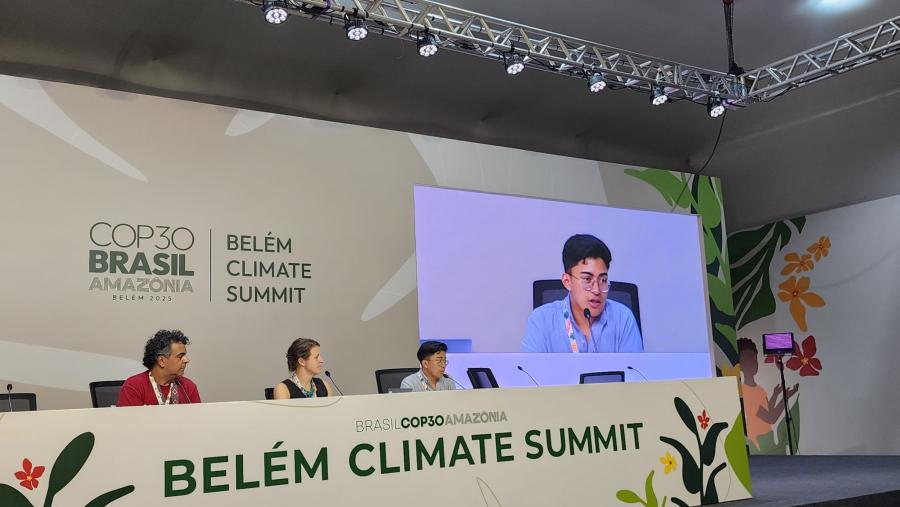
By Edson Krenak (Krenak, CS STAFF)
In this text in which I make use of a third-person journalistic voice, of denunciation, of a witness, I also change to a first plural voice, because it is not only a people there in another country that is being attacked but my people, my, our relatives and partners in defending human rights, the rights of Indigenous Peoples and partners in protecting the forest.
Yanomami and Munduruku Peoples in the north of Brazil experienced a terrifying attack in May 2021. Men linked to mining activities and armed with firearms shot at Yanomami and Munduruku houses, set fire to their villages, and tried to expel Indigenous Peoples from their lands using homemade bombs. The federal police were called in and local actions were taken, but State officials failed to make a statement condemning the violence. For decades, the Guaraní in the State of Mato Grosso, the same region where Xavante Peoples live, have suffered from the pernicious power of agribusiness that has violated their human rights and led to conditions of poverty. This attack is but one illustration of the three enemies facing Indigenous Peoples in Brazil: the leniency and negligence of an anti-Indigenous State, monocultural enterprises, and illegal mining operations.
The Brazilian State is not only lenient and negligent due to its lack of resources or technical capacity—it is part of a capitalist and colonial development project that prioritizes profit over human beings. This system attacks the rights of Indigenous Peoples, threatening the lives of dozens of species in various biomes, such as animals, forests, rivers, and insects by allowing and encouraging operations that destroy the environment.
In May 2021, the Federal Public Prosecutor in Mato Grosso State requested that the National Indian Foundation (FUNAI) and the Brazilian Institute for the Environment and of Natural Resources (IBAMA), a State agency, remove the following phrase from the legally binding policy document, Normative nº 01/2021, “mixed composition of Indigenous and non-Indigenous organizations.” The implication of this phrase violates the constitutional principle of exclusive usufruct (the right to use and derive income or benefit from someone else’s property with the basic obligation of preserving its form and substance and returning it at a designated time), guaranteed to Indigenous Peoples in the 1988 Federal Constitution. The consequence of this change is the handing over of Indigenous lands to non-Indigenous organizations and corporations, allowing them to operate freely in their territories: an indisputable undermining of the territorial and environmental rights of Indigenous communities. Having been co-issued by FUNAI, it is a clear attack on the very groups that the State and FUNAI are supposed to protect—and an open door to massive deforestation and mining operations. The strategy, defended by President Bolsonaro and implemented by his ministers, is already in operation in several Indigenous territories via land leasing and agribusiness operations.
The monoculture of soy, rice, and eucalyptus have devastated some of the country’s biomes. Furthermore, mining in general on Indigenous lands is illegal and dangerous. Recently it became even more perilous, as it has been linked to new militias, organized crime, and Brazilian drug cartels, which have recently invaded Indigenous lands in search of gold and other precious metals. Mercury contamination of rivers and forests is only the tip of the iceberg, as criminal groups bring with them a path of violence, drugs, and other threats to Indigenous lands.
The worrying increase of the presence in Indigenous lands of drug cartels and militias, armed groups that illegally sell and privatize public security based on corrupted means, is, according to Indigenous journalist and activist Ailton Krenak, a direct consequence of the strange and obscure relationship between Minister of Environment Ricardo de Aquino Salles and those groups. He adds, "It is difficult to imagine that the Yanomami people, for example, who live inside the forest have to deal with organized crime...and the violent reality of the slums extended into the forest. The Brazilian state is again waging war against the native peoples. The guy remains a minister, and nothing happens to him, even under investigation. Here, in Brazil, this denunciation is not having an effect, we need an international denunciation."
This form of favelization of the Indigenous land represents for Indigenous Peoples a new and highly dangerous form of colonization. It is not only that the State that makes these actions possible, but it supports them. The favelization operated by criminal groups brings dire violence onto Indigenous territories, but the Government does nothing to contain them.
(NOTE: After finishing this article, I had to change it, as the Munduruku suffered another attack and their leaders had to be escorted out of the villages by the local police and protected in a secret place, due to the gravity of the most recent attacks).
For Indigenous Peoples in Brazil, mining in any form and monoculture are illegal actions that disrespect and defile Mother Earth, compromising the balance of nature and life itself. As the Yanomami leader Davi Kopenawa Yanomami, in his book, The Falling Sky, asserts, “When all these thick white smoke plumes rise up to the chest of heaven and the thunder begins to die, what will become of the forest? That’s why we get restless. There are no medicines to heal the Earth and make it well again. If you white people kill the forest, you won’t be able to make another, new one. When all these shiny things that you pull out of the earth, the gold, the diamonds, the ores, and also the fire-making things and all the trees, when all that is gone, the Earth will be dead.”
Indigenous Houses Attacked
Photo courtesy of Xingu Vivo/2020.
“Please come, they are going to burn my house… They are shooting, please help me!” shouted Maria Leusa Munduruku in an audio message recorded around 1:00 p.m. on May 26, 2021, in Tapajos village near Jacareacanga city in southwestern Pará, northern Brazil. Invasions have multiplied thanks to the hatred and anti-Indigenous speech of President Bolsonaro. Because Indigenous communities are isolated in the territory, the federal government is co-opting many individuals through corruption, dividing communities, and causing internal conflicts. Scarcity of resources, social problems, and escalating violence cause enormous cultural and social pressure on countless Indigenous Peoples, generating division, weakening legal protections, and fragmenting the social fabric. Particularly impacted are the Guaraní and Xavante in the Cerrado region and the Yanomami and Munduruku in the Amazonas.
On Munduruku and Yanomami lands, mining has destroyed tens of kilometers of rivers, contaminating the water with mercury and bringing diseases to their lands. The government has caused internal divisions and countless episodes of violence, and the Xavante people are also suffering from the unprecedented destruction and degradation of the biome, the cerrado, caused by the large-scale monoculture of soy and cattle raising. The National Congress has supported coordinated actions of government ministries in the Bolsonaro administration and criminal groups encroaching on Indigenous lands.
Withdrawing from the ILO Convention 169
In addition to undermining the rights of Indigenous Peoples and the escalating violence, the Brazilian House of Representatives wants to legalize crimes committed against the environment. Bolsonaro’s political alliance in the National Congress, the Ruralist Party (Bancada Ruralista), has been discussing Legislative Project No. 177/2021, which would authorize Bolsonaro to denounce and reject ILO Convention 169, the oldest binding international instrument that specifically deals with the rights of Indigenous and Tribal peoples in the world, to which Brazil has been a party since 2002. In theory, every 10 years, member countries of the treaty can request the unbinding of the text through the complaint procedure.
Since the beginning of the current government, there have been hundreds of initiatives in the National Congress aimed at weakening legal protections for Indigenous Peoples and their territorial rights. These measures are weakening Brazilian legislation and the Constitution instead of protecting those who are most vulnerable. The government wants to approve projects on the territories of Indigenous and Quilombola Peoples regardless of whether they are unconstitutional, violate rights, or destroy protected areas of biomes.
Under a public inquiry related to COVID-19, Bolsonaro, who refuses to fight the pandemic in the country, so far has not commented on environmental crimes and human rights violations on federal and Indigenous territories. Nor “did he even mention the fight against illegal mining, drug trafficking, and other serious issues that plague Indigenous lands elsewhere and especially in the triple border region with Venezuela and Colombia,” said Marivelton Barroso (Baré), President of the Association of Indigenous Peoples of the Rio Negro in Amazonia.
Bolsonaro did visit those areas, but not without the protest of Indigenous communities who felt indignation that the President visited Indigenous areas without wearing a mask or following COVID-19 protocols. He also used names of non-existent ethnic groups to refer to Indigenous Peoples, creating at his pleasure a new ethnic group, that of the “Balaio” Peoples, which does not exist in Brazil. “The country’s President has had this shameful, mocking, and affronting stance against traditional communities since his election campaign,” says Marivelton Barroso (Bare).
Armed and Dangerous Prospectors
Photo courtesy of Maria Munduruku.
Another case in May 2021 that frightened several Indigenous communities was the attack on small Yanomami communities by armed miners. A shocking video was published online by Correio Braziliense, a newspaper with wide circulation in the country. The Hutukara Associação Yanomami informed authorities and Indigenous communities in the region that a group of seven garimpeiro (illegal miners) vessels would be attacking Indigenous communities in the region, mainly Palimiú, located in Alto Alegre in the north of the country near the border with Venezuela. Since April, this is the third conflict between miners and Indigenous Peoples in less than 15 days, according to the Hutukara Associação Yanomami.
These attacks come as a form of retaliation after the Yanomami and Munduruku Indigenous Peoples seized materials from the miners and denounced government-backed criminal groups operating in the region. The Uraricoera and Tapajos Rivers, important water sources for those communities, are the most affected by illegal gold mining, uncontrolled use of mercury, and rising violence brought by more than 25,000 illegal miners within their territories. The national Indigenous community has called on authorities to act urgently to prevent the continued spiral of violence in the area and to ensure security for the Yanomami communities in Palimiu, and others like Munduruku.
Supporting Indigenous-Led Forms of Resistance
We, Indigenous Peoples in Brazil, are fighting these enemies in many ways, but we need support, visibility, and actions by people, organizations, and governments. We have found some forms of resistance. The Munduruku has been organized through the Women's Association Munduruku, led by Maria Leusa Munduruku, whose house was burned down. Currently, Cultural Survival’s Keepers of the Earth Fund is supporting one of the Munduruku communities in order to aid the vulnerable villages. Such an organization shifts the attention and balances the power in and out of their communities. The Xavante, also a 2021 Keepers of the Earth Fund grant partner, through advocacy and restorative agriculture projects, have been trying to defend their lands facing the growing number of monocultural enterprises.
Our Indigenous lands before Bolsonaro’s arrival were poorly protected by FUNAI, but there was at least some protection and we were gaining terrain. But now our rights and communities are being massacred and our lands stolen by miners, ranchers, and soy and eucalyptus planters, within a plan to hand the Amazon over to a timber trader by the current environment minister, Ricardo Salles.
Given the economic weight of agricultural groups linked to deforestation and the massive invasion of miners motivated by the end of the demarcation of Indigenous lands, we need strategic actions and more partners in our cause. We need assistance in the following areas:
- Raising awareness to the international community about violations of human and Indigenous rights in Brazil
- Education within communities on the root causes of issues we are facing
- Pressure from countries and international allies for Brazil to respect Indigenous rights
- Joint and widespread advocacy actions
- Support of Indigenous Peoples and their heroic projects for the protection of Mother Earth
In the context of climate change, it is frightening to imagine the lack of State response to address illegal mining and criminal activity on Indigenous lands, while these communities are stewarding forests and rivers that protect biodiversity and mitigate against climate change. Meanwhile, these communities are also continuing to confront the COVID-19 Pandemic.
At this moment, dozens of Indigenous activists, men, women, and even children are marching to Brasilia, the country's capital, to protest and denounce these abuses and threats. Protestors are demanding audiences with authorities, seeking action from the state and the application of the law.
At the same time, other organizations and allies have been helping to spread the news about this difficult situation. We believe that with information, international pressure, and public awareness of what is happening, a difference can be made.
We count on your support.



